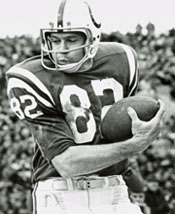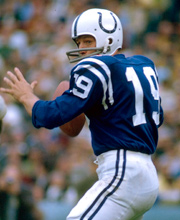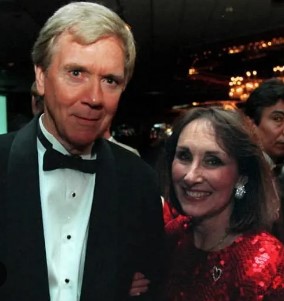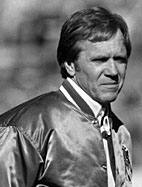|
Football Short Story
Too Thin, Too Slow, Wears Contact Lenses
Strange & Amazing Football Stories, Bill Gutman (1986)
To some players, gaining an advantage on their opponents doesn't always mean deception or trickery. Take the case of Raymond Berry, the great pass receiver for the Baltimore Colts in the late 1950s and 1960s. Berry was the favorite target of quarterback John Unitas, and the two formed one of the greatest passing combos in National Football League history.
But Raymond Berry didn't have the natural physical attributes of many of the league's top receivers. He was tall enough at 6'2", but he was a thin 185 pounds and speed of many top wideouts and wore contact lenses during games. In addition, he wore a corset to protect a fragile back.
How, then, did Raymond Berry become one of the most productive pass receivers. The secret was dedication and practice. In fact, Raymond Berry may have practiced more than any receiver before or since. He practiced catching his patterns until each one was precisely orchestrated to perfection. And he practiced coordinating his patterns with quarterback Unitas until the two knew each other like a pair of matched bookends.
    L-R: Raymond Berry, John Unitas, Sally Berry, Coach Raymond Berry In fact, Raymond Berry practiced so much that he often ran out of people willing to throw passes to him. For a while he fretted over the situation. Then he found an answer. The resourceful wide receiver found his own personal passer—his wife, Sally! It might have been a first.
"Sally's got a good arm," Berry would say whenever someone questioned the tactic. Anyone watching their workout agreed. Sally Berry wasn't going to put John Unitas out of a job, but she threw crisp ten- to fifteen-yard passes with good accuracy, more than enough to give her husband the kind of practice sessions he craved. She threw the ball just where he wanted it—high, low, behind him, over his head, right, left, again and again and again.
The practices were extremely important to Berry, who felt that all the good habits and good instincts had to be absorbed in practice. "In a game there's no time to think. Good practice habits keep you toned up and you do certain things without thinking in the games."
Berry's good habits made him the best split end of his day. He was instrumental in helping the Colts to NFL titles in 1958 and '59. In 1960 he had his best season with 74 catches for 1,298 yards and ten touchdowns. And his career stats place him among the pass receiving elite.
Always a stickler for detail, Berry didn't change his habits when he became head coach of the New England Patriots midway through the 1984 season. Perennial underachievers, the Patriots of recent vintage had never seemed to live up to preseason expectations. Berry was not only instrumental in turning the team around in '84, but in 1985 he surprised the entire pro fooball world by leading the upstart Pats all the way to the Super Bowl. Observers claimed that Berry's careful preparation and insistence on meticulous practice habits were crucial in enabling the team to put it all together. Bidding to become only the second wild-card team in NFL history to win the Super Bowl, the Pats were short-circuited in the final game by the rough, tough Chicago Bears.
Raymond Berry's pro coaching career is still ahead of him, but no matter what the future holds, nothing will ever dim his achievements as a player. On the gridiron his so-called eccentricities contributed to his success as much as anything else. For instance, to avoid jamming his thumbs, he built up their strength squeezing Silly Putty in his spare time. But of all the things Raymond Berry did to gain an advantage on the gridiron, perhaps the most important was proposing to a girl who had a durable and accurate throwing arm. Sally Berry might have been the most important quarterback in Raymond Berry's football life.
|